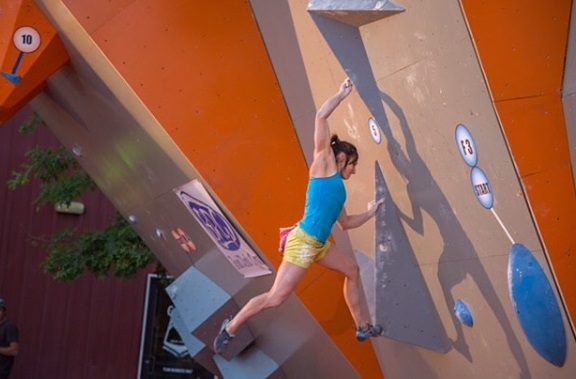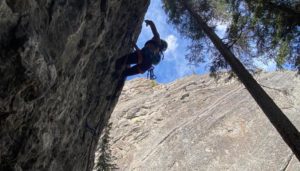Indoor Weekly: Growing Pains for Bouldering Comps

Competition climbing is more popular than ever, internationally and in Canada, and the sport is going through a number of growing pains.
There are thousands of strong Youth and Open climbers all wondering what the future of the sport will be now that Boulder, Lead and Speed are in the Olympics in 2020.
Over the past few weeks, ever since the USA Climbing Nationals introduced a new scoring system with very dynamic problems, climbers have been sharing their thoughts online.
Andrew Bisharat of Evening Sends pointed out that “the goal of route setters is to create problems so difficult that most can’t do them, but not so difficult that no one can do them… Consider what an incredibly small, moving target this must be to hit. There might not be a more difficult job in climbing than setting for a big bouldering comp.”
He continued later in the article, “Climbing difficulty by itself is just too subjective—and when you add in the fact that a human being with human emotions is designing these subjective challenges not only for competitors, but with exact competitors in mind, how does that not undermine our faith in the very promise of fair competition?” Read the full article here.
Top American climber Daniel Woods wrote on Instagram, “It’s funny going from winning nine of these events, to not even making finals two years in a row.
“Things have changed. New holds, new volumes, new way of setting, new competitors. The solution to success in these events is adapting to what’s presented. Excited to try again next year with a different approach.”
Canadian podcaster Tyler Norton talked to climber Sierra Blair-Coyle, route-setter Simon Parton, gym owner Will Anglin and photographer Eddie Fowke on Plastic Weekly, listen here.
All four agreed that change was neccessary to the complicated and complex American system. Norton followed up his podcast with the video below.
However, at the recent USA Nationals, Alex Puccio won her 11th consecutive event. Top climber Ashima Shiraishi landed in second, but under the old scoring rules would have won.
Quebec-based climber Mathieu Elie has written an article called “Problems in modern bouldering: Olympics, Presentation & Scoring systems” in which he talks about issues facing Boulder comps.
“Can we claim that Alex Puccio is the champion for the 11th time in a row if, in previous years, and everywhere else, Shiraishi would have won hands down?” said Elie.
“Again, far from me the idea of diminishing the achievements of Alex Puccio, as she has always been an impressive climber, but it seems imperative to look into these kind of questions.”
In the article, he talks about scoring systems: progress and success, the rightness or the spectacular, intrinsic bias and competitors’ opinions. Read the article here.
The IFSC recently released how they’ll be scoring Bouldering at the World Cups this year. They state that “the scoring system that will greatly improve the understanding of standings for a non-endemic audience and allow for predictions during competitions.”
The “bonus” hold will take back its original name of “zone” and the scoring sequence will now be:
1. Number of Tops (T)
2. Number of zones (z)
3. Number of attempts to Top (A)
4. Number of attempts to zone (shown only in case of ties)
The Bouldering scoring system was approved by the Executive Board and will be in place for the 2018 season.
Bouldering competitions have become a blend of parkour and technical climbing. Many climbers have said bad things about the changes, but it’s only diversified the styles and types of climbers who can excel.
Indoor bouldering problems are nothing like outdoor problems, they’ve become a new category of climbing. Pulling on small crimps and running between volumes are both difficult to do in their own right.
Climbers today need to be versatile, as do route setters who must push a climber’s coordination, body positioning, strength, endurance and commitment. And route setters can’t be bias or think of the strengths and weaknesses of certain top competitors.
Bouldering comps will continue to go through growing pains. With the Tokyo Olympics only two years away, there’s surely a number of officials trying to figure out how to best make it work.
And while Bisharat’s suggestion of using artificial intelligence to set routes might be the least biased and most forward thinking, it seems for now that career route-setters will be determining how competitors push themselves.


